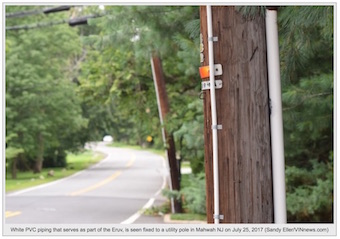Mahwah, N.J., on Aug. 24 voted to spend up to $250K to fight placement of white piping running the length of 120 or so utility poles to symbolize an eruv, which turns outdoors into indoors for believers.
With an eruv, Orthodox Jews can push baby carriages and wheelchairs of seniors, carry keys and perform a host of other tasks. Markers are required on the poles which range from nearly invisible to highly visible.
 |
Representing pro bono the Bergen Rockland Eruv Assn. and two residents is Weil, Gotshal & Manges, the 20th largest law firm in the U.S. with 1,072 lawyers and $1.1 billion in revenues.
WG&M represented the East End Eruv Assn. in its lengthy battle with Southampton, Westhampton and Quogue, a conflict that ended in 2015-16 after eight years with the towns agreeing not to oppose eruvim in their communities.
Westhampton signed an agreement in June 2016.
Courts held that the eruvim markers were not “signs.” The towns, having spent more than $1 million in legal fees and staff time, and facing the prospect of having to pay the bills of WG&M, consented to the eruv. Outside legal counsel rather than Mayor Maria Moore signed the agreement with the EEEA.
“Zealous” Fight Promised by Mahwah
Mahwah Mayor Bill Laforet and other officials ordered removal of eruv markers July 21. Council President Robert Hermansen said the town is taking the imposition of markers on utility poles on public property “very seriously.”
Councilman Jonathan Wong told 200 residents at a meeting Aug. 24 that law firms will “efficiently and zealously represent the township. His remarks drew applause, reported northjersey.com.
Lead law firm is Holwell, Shuster and Goldberg, New York, assisted by Cleary Giacobbe Alfieri and Jacobs, Oakland, N.J.
Northjersey.com said “Hundreds of residents in Mahwah and Upper Saddle River have demanded the eruv’s removal, with some voicing concern that New York State’s large Orthodox Jewish population would potentially move across the New York border into Bergen County.”
Upper Saddle River Opposes Eruv
Upper Saddle River Mayor Joanne Minichetti told a town hall meeting July 31 that the legal battle is on hold. The borough has agreed not to enforce its takedown notice against the eruv immediately, and to allow the eruv to be repaired, she said. A suit has been filed against the town in federal court in Newark, she noted, and Upper Saddle River “will aggressively fight to enforce our ordinance."
Minichetti warned speakers that “This is a matter of excessive entanglement with religion and violation of municipal ordinances. It is not directed at any particular religious group. The governing body will not tolerate or countenance any anti-Semitic or otherwise discriminatory comments at our public meetings and urges residents to avoid any such statements on social media or elsewhere. Such statements will not be helpful to the borough’s position and are totally inappropriate.”
Opposing Eruv is "Anti-Semitic"
The Forward (formerly the Jewish Daily Forward) wrote July 31 that while some municipalities have been “incredibly hospitable” to eruvim, others including Tenafly, N.J., and Westhampton Beach, N.Y., have fought the markers on utility poles and lost. Their argument that separation of church and state was being violated was rejected by the courts, it noted.
Eruvim foes have lost in every case, said The Forward.
In Tenafly, it noted, the court found that the borough had allowed plenty of signs on utility poles, taking issue only in the eruv case; such selective enforcement against a religious group constituted religious discrimination in violation of the First Amendment, the court argued.
In Westhampton Beach, the court rejected the idea that a barely perceivable admixture of string and plastic, lacking any “overtly religious features,” would lead the observers to infer that the state had pursued some sort of religious agenda—and thereby impermissibly merged church and state.


 Husch Blackwell Strategies has added FleishmanHillard alum Michael Slatin as a principal in its public affairs group.
Husch Blackwell Strategies has added FleishmanHillard alum Michael Slatin as a principal in its public affairs group. Rory Cooper, a veteran Republican operative and policy specialist, has joined Teneo’s Washington office as senior managing director in its strategy & communications practice.
Rory Cooper, a veteran Republican operative and policy specialist, has joined Teneo’s Washington office as senior managing director in its strategy & communications practice. Brian Fallon, who served as national press secretary for Hillary Clinton’s 2016 presidential run, is signing on next month as Vice President’s Kamala Harris’ campaign communications director.
Brian Fallon, who served as national press secretary for Hillary Clinton’s 2016 presidential run, is signing on next month as Vice President’s Kamala Harris’ campaign communications director. TikTok is nothing more than a Chinese propaganda tool that poses “a grave threat to America’s national security and, in particular, impressionable children and young adults,” say two Congressmen who want the platform registered as a foreign agent.
TikTok is nothing more than a Chinese propaganda tool that poses “a grave threat to America’s national security and, in particular, impressionable children and young adults,” say two Congressmen who want the platform registered as a foreign agent. Public Strategies Washington has added Abbie Sorrendino, a former aide to now Senate Majority Leader Chuck Schumer.
Public Strategies Washington has added Abbie Sorrendino, a former aide to now Senate Majority Leader Chuck Schumer.


 Have a comment? Send it to
Have a comment? Send it to 
No comments have been submitted for this story yet.